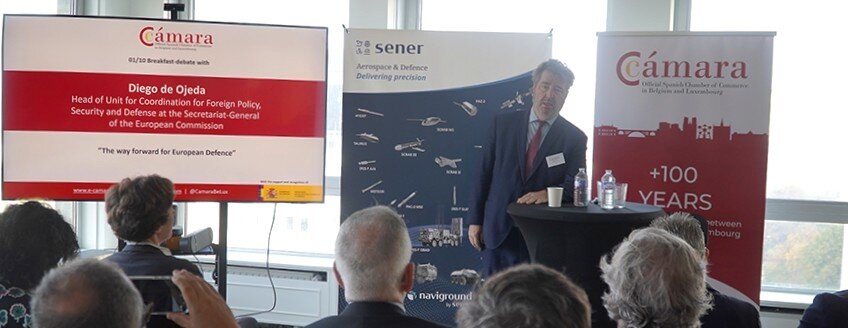Diego de Ojeda outlines “the way forward” to strengthen European defense
On Wednesday, October 1, Diego de Ojeda, Head of the Unit for Coordination of Foreign, Security and Defense Policy at the European Commission’s General Secretariat, presented the Commission’s vision for the future of European defense at the Chamber’s headquarters. The event was sponsored by Sener.
The session was opened by Pablo López Álvarez, President of the Official Spanish Chamber of Commerce in Belgium and Luxembourg, who thanked the sponsors for their support and underlined the importance of European defense in today’s political landscape.
José Julián Echevarría, Managing Director of Sener Aerospace, then took the floor. He stressed that the current international environment, shaped by the war in Ukraine and a reduced U.S. role in European security, requires Europe to take greater responsibility for its own defense. He pointed to rising national budgets, the need to deepen public-private cooperation, and the importance of a long-term industrial strategy to reduce reliance on external suppliers.
Following this introduction, De Ojeda set out his proposal on “the way forward for European defense.” He emphasized that threats to European security have increased and that “the American guarantee is no longer enough,” calling on Member States to “spend more, spend better, and spend in a more European way.” He explained that the Commission is finalizing a document – a Road Map– to be presented to the Council, providing a framework for coordinating defense programs and making better use of available resources. “The myth that only U.S. equipment is fast and effective is no longer true; Europe must leverage its own industrial capacity and act together,” he stated.
The session concluded with a lively Q&A, addressing issues such as innovation in the drone sector, supporting Ukraine as a hub of technological innovation in defense, the timeline for strengthening capabilities before 2030, and the role of the United Kingdom in this context. De Ojeda reiterated that the objective is not force but deterrence: “We must send a clear political message that preparedness is absolutely urgent; if we don’t yet have the entire house, we must at least build the foundations and the walls.”


